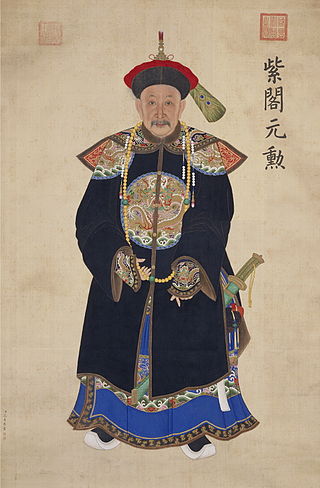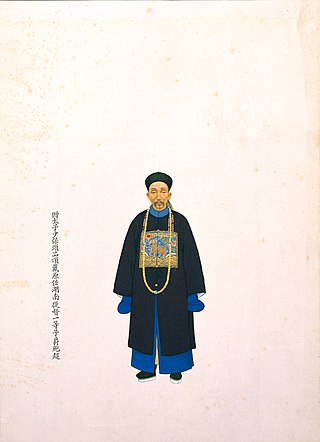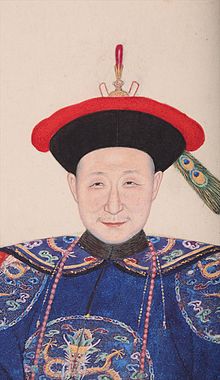
Ebilun was a Manchu noble and warrior of the Niohuru clan, most famous for being one of the Four Regents assisting the young Kangxi Emperor from 1661 to 1667, during the early Qing dynasty (1644–1912). A largely passive figure during the regency, Ebilun was disgraced following the ouster of the far more powerful regent Oboi and considered a political supporter of the latter. He was stripped of his positions by the emperor but later regained his noble rank. Many of his descendants became influential figures in the Qing imperial government.
Mingju, of the Manchu Nara clan, was an official of the Qing Dynasty during the reign of the Kangxi Emperor. He was thrown in prison for corruption.

Keying, also known by his romanized Mandarin Chinese name Qiying or Ch'i-ying (Wade–Giles) and his Manchu name Kiyeng, was a Manchu statesman during the Qing dynasty of China. An imperial clansman of the house of Aisin Gioro, he began his career in the Imperial Clan Court. He conducted several peace treaties with Western powers, beginning with the Treaty of Nanking, which ended the First Opium War with Britain in 1842. Keying was sent to negotiate again in 1858 to settle the Arrow War with Britain and France, but the settlement was repudiated by the Xianfeng Emperor and he was forced to commit suicide.

Heshen (Manchu: ᡥᡝᡧᡝᠨ, Möllendorff: Hešen; Chinese: 和珅; pinyin: Héshēn; Wade–Giles: Ho2-shen1; 1 July 1750 – 22 February 1799) of the Manchu Niohuru clan, was an official of the Qing dynasty favored by the Qianlong Emperor and called the most corrupt official in Chinese history. After the death of Qianlong, the Jiaqing Emperor confiscated Heshen's wealth and forced him to commit suicide. As an official, he acquired an estimated at 1.1 billion taels of silver, equal to roughly US$270 billion. Heshen is remembered as one of the richest men in history.
Tulišen was a Manchu official and diplomat during the early Qing dynasty.

Agui was a Manchu noble general for the Qing dynasty. As the only son of Akdun, he was a scion of a noble family who led a number of important Manchu military operations, including several of the "Ten Great Campaigns".

Bao Chao (1828–1886) was an eminent Han Chinese official, military Captain General, of the late Qing Dynasty in China. He raised the Xiang Army to fight effectively against the Taiping Rebellion and restored the stability of Qing Dynasty along with other prominent figures, including Zuo Zongtang and Zeng Guofan, setting the scene for the era later to fight against known as the "Nien Rebellion". He was known for his military perception.
Cheng Xueqi (Chinese: 程學啟; courtesy name Fangzhong 方忠; born in Tongcheng, Anhui, was a general of the Taiping Rebellion who surrendered to the Qing dynasty in 1861 with Ding Ruchang. He was an eminent Han Chinese official and a Captain General in the army of the late Qing dynasty. He led the Huai Army to fight effectively against the Taiping rebels and helped to restore the stability of Qing, along with other prominent figures, including Li Hongzhang and Zeng Guofan, setting the scene for the successful defense of Shanghai and the Suzhou Massacre POW Incident. The Tongzhi Emperor praised Cheng as "intelligent and brave".

Sun Shiyi, courtesy name Zhizhi (智冶), pseudonym Bushan (補山), was an official of the Qing dynasty who served as the Viceroy of Liangguang and of Liangjiang during the reign of the Qianlong Emperor.
Jirgalang or Jirhalang was a Manchu noble, regent, and political and military leader of the early Qing dynasty. Born in the Aisin Gioro clan, he was the sixth son of Šurhaci, a younger brother of Nurhaci, the founder of the Qing dynasty. From 1638 to 1643, he took part in many military campaigns that helped destroy the Ming dynasty. After the death of Huangtaiji in September 1643, Jirgalang became one of the young Shunzhi Emperor's two co-regents, but he soon yielded most political power to co-regent Dorgon in October 1644. Dorgon eventually purged him of his regent title in 1647. After Dorgon died in 1650, Jirgalang led an effort to clean the government of Dorgon's supporters. Jirgalang was one of ten "princes of the first rank" (和碩親王) whose descendants were made "iron-cap" princes (鐵帽子王), who had the right to transmit their princely titles to their direct male descendants perpetually.

Geng Jingzhong was a powerful military commander of the early Qing dynasty. He inherited the title of "King/Prince of Jingnan" (靖南王) from his father Geng Jimao, who had inherited it from Jingzhong's grandfather Geng Zhongming.

Fuheng, courtesy name Chunhe (春和), was a Qing dynasty official from the Manchu Fuca clan and the Bordered Yellow Banner of the Eight Banners, and was a younger brother of the Empress Xiaoxianchun. He served as a senior minister at the court of his brother-in-law, the Qianlong Emperor from the 1750s to his death in 1770. He is best known for leading the Qing troops in the fourth and last invasion of Burma in the Sino-Burmese War (1765–1769).
Mingrui (Chinese: 明瑞, Manchu: ᠮᡳᠩᡧᡠᡳ, mingšui, Burmese: မင်းယွီ, Burmese pronunciation: [mɪ́ɰ̃ jwì]; was the first General of Ili from October 1762 to March 1767 and then Governor-general of Yunnan and Guizhou from April 1767 to March 1768. A son-in-law of the Qianlong Emperor of the Qing dynasty, Mingrui was appointed by the emperor to lead a 50,000-strong invasion force led by the elite Manchu Bannermen in the third campaign of the Qing invasions of Burma. While his 1767–1768 campaign was the most successful of the four invasions by the Chinese, his army was annihilated at the Battle of Maymyo in March 1768. He committed suicide, and sent in his queue to the emperor as a token of loyalty. The Qianglong emperor ordered Manchu general Eledeng'e to be sliced to death after his commander Mingrui was defeated at the Battle of Maymyo in 1768 because Eledeng'i was not able to help flank Mingrui when he did not arrive at a rendezvous.
Fuqing was a Manchu who began his career in the Imperial Guard, and in 1744 was sent as Resident to Tibet where he remained until the danger of a Tibetan-Dzungar alliance seemed over. The last king of Tibet would not submit to the tutelage of the Qing dynasty, and having poisoned his elder brother, proceeded to prepare for revolt. Fuqing returned with all speed and slew the king in the Chinese Residency, whither he had lured him, the result being a popular rising in which he and his staff perished. The present government system of four Kablon under the Dalai and Panchen Lamas was then established. The Resident's guard was raised to 1500 men, and all intercourse with Tibet and Dzungaria was forbidden. The Qianlong Emperor published a special decree defending the treachery of Fuqing, and ennobled his heir as Viscount. Canonised and included in the Temple of Worthies.
Sun Jiagan was a Chinese politician of the Qing dynasty.
Eminent Chinese of the Ch'ing Period (1644–1912) (ECCP) is a biographical dictionary published in 1943 by the United States Government Printing Office, edited by Arthur W. Hummel, Sr., then head of the Orientalia Division of the Library of Congress. Hummel's chief collaborators were Dr. Tu Lien-che (杜聯喆) and Dr. Fang Chao-ying (房兆楹), Chinese scholars who were married to each other.

Geng Jimao or Keng Chi-mao was a Chinese prince and military leader. He inherited the title of "Jingnan Prince", meaning "Prince who pacifies the South", from his father Geng Zhongming, along with his lands. He then passed it on to his son Geng Jingzhong.
Changling, 1st Duke of Weiyong born in Sartuk clan (薩爾圖克氏), was a Qing dynasty official of Mongol descent. He began life in 1775 as a secretary of the Grand Council, after taking the Xiu cai degree at the Manchu examination. In 1787 he fought in Taiwan, and in 1792—95 against Nepaul. In 1800 he was in command of the expeditionary force sent against insurgent bands in Hubei, and subsequently in various operations undertaken from time to time against disturbances caused by the evil influence of secret societies. He became successively Governor of Anhui and Shandong, and in 1807 Viceroy of Shaan-Gan. In 1808 he was impeached on several charges and stripped of his rank, and then banished to Ili. A few months later he was once more employed, and gradually rose again to the highest posts. In 1825 he was General of Ili. In 1826, when the rebel Jahangir Khoja crossed the frontier and began his depredations, capturing Kashgar, Yangihissar, Yarkand and Khoten, he was appointed Generalissimo; and by the end of 1827 had captured Jehangir and put an end to the rebellion. The prisoner was sent to Beijing in a cage, and brained in the presence of the Daoguang Emperor, who conferred on Changling a triple-eyed peacock's feather. He was canonised as Wenxiang, and admitted into the Temple of Worthies.

Yengišan was a Manchu official of the Qing dynasty, who was part of the Bordered Yellow Banner. He served various official positions during the Qing dynasty. His father is Yentai.
Li Yongfang was a Chinese general of the Ming dynasty and Qing dynasty known for defecting to the Qing dynasty, due to the Ming dynasty losing the city of Fushun in Liaoning to the Qing. Li Yongfang along with many other Han Chinese defected to the Qing as the old Ming system was declining and corrupt, and the Qing provided an opportunity for the Han Chinese to continue their culture. One of Li Yongfang's descendants Li Shiyao was sentenced to death by the Qianlong emperor but was spared his life when he helped suppress the Lin Shuangwen rebellion in Taiwan.










